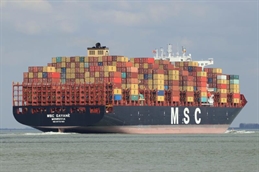
MSC, the world's largest shipping line, strongly refuted a report alleging that it has been "infiltrated" by a "cocaine-smuggling cartel" after the US$1 billion raid on the containership MSC Gayane in Philadelphia port back in 2019.
The Bloomberg report on December 16 titled "How a Cocaine-Smuggling Cartel Infiltrated the World's Biggest Shipping Company" reported that "as MSC grew into a dominant force in global trade, it also became a prime drug-trafficking conduit for Balkan gangs."
In its statement, the Geneva-headquartered company strongly denied the report.
"MSC strongly objects to Bloomberg’s headline claim that the subversion of a small number of seafarers from Montenegro, in what remain very specific circumstances, amounts to the 'company' being 'infiltrated' by a drugs cartel," the shipping line said.
MSC noted that most of the elements in the Bloomberg story have already been publicly reported during the 3½ years since the Gayane incident, and MSC’s Victim Impact Statement related to the incident was filed in court.
"The cocaine trade has been surging in recent years, and this is an industry-wide issue. All modes of transport, from ships to trucks, trains and planes, are subject to the threat of illicit trafficking, and as long as consumption continues, supply through international drug cartels will persist," it said, adding that shipping lines and their staff are "neither mandated, resourced, nor trained to confront the dangerous individuals who operate organized criminal organizations."
On June 17, 2019, the MSC Gayane was stopped in Philadelphia after law enforcement discovered approximately 20 tons of cocaine on board, costing US$1.3 billion. Several crew members were also jailed for their involvement in the said operation, and eight crew members from the ship — five from Montenegro, two from Samoa, and one from Serbia — pleaded guilty to the drug smuggling scheme.
"The traffickers behind the MSC Gayane incident used groundbreaking methods to smuggle their drugs, and the operation could not have been foreseen or predicted by any honest shipping operator," MSC said.
"MSC, like others in the liner shipping industry, remains firmly opposed to this illegal trade and actively takes steps to counter the criminal's new techniques.
MSC noted that most of its crew are "honest, good at their job and work hard to earn a living for themselves and their families", and all contractors to MSC passed through a "robust vetting" procedure that included the U.S. C-1/D visa for all Montenegrins who would call at U.S. ports.
"While MSC's precautionary response to the Gayane drug seizure was to reallocate its Montenegrin contractors away from shipping routes that are most vulnerable to drugs trafficking, the company takes issue with the article's overall characterization of one of the country's maritime workforce based on the emergence of a tiny minority of criminals among them."
"Unfortunately, there will always be individuals who can be corrupted by drugs traffickers – or, even more, difficult to predict, decent people who will succumb to violent threats by dangerous criminals against them and their families. This is a human factor which is impossible for individual companies to control entirely."
MSC further said that the MSC Gayane incident was certainly a "wake-up call" for the entire container shipping and logistics industry, given the elaborate nature of the underlying criminal activity.
MSC noted that it has significantly intensified its own security efforts, investing far in excess of US$50 million in 2022.
"In fact, there are now more than 50 different ways in which MSC seeks to detect potential illicit activity across major trade lanes, including state-of-the-art and proprietary technology based on artificial intelligence, in close cooperation with law enforcement bodies," it said.
MSC went on to note that the global drugs trade is a "systemic problem" that no single company can address alone.
"From the sources of production to the consumers who drive demand, everybody in the supply chain must seek to play their part, to help law enforcement, customs and port authorities to better control the issue," MSC added.



